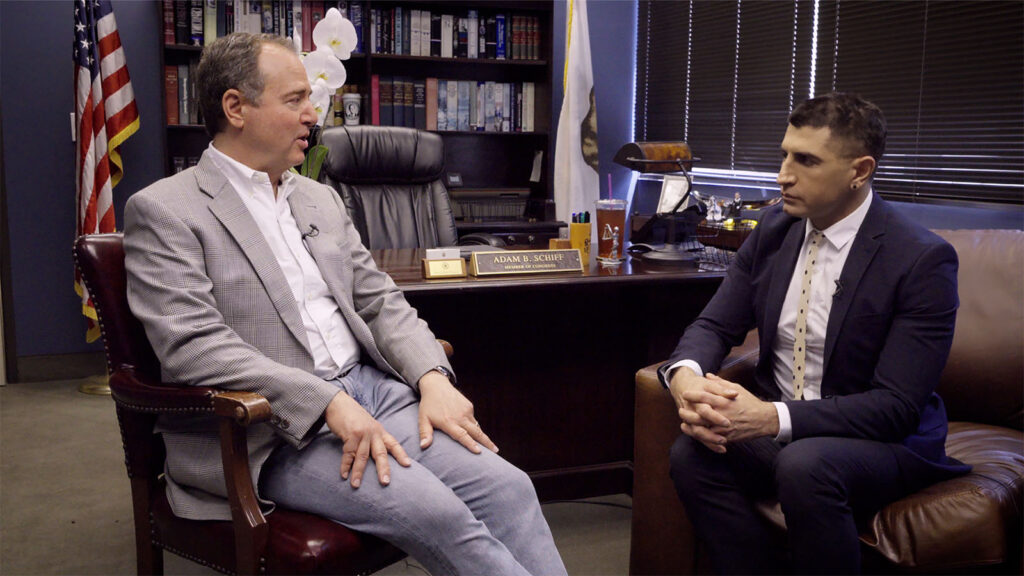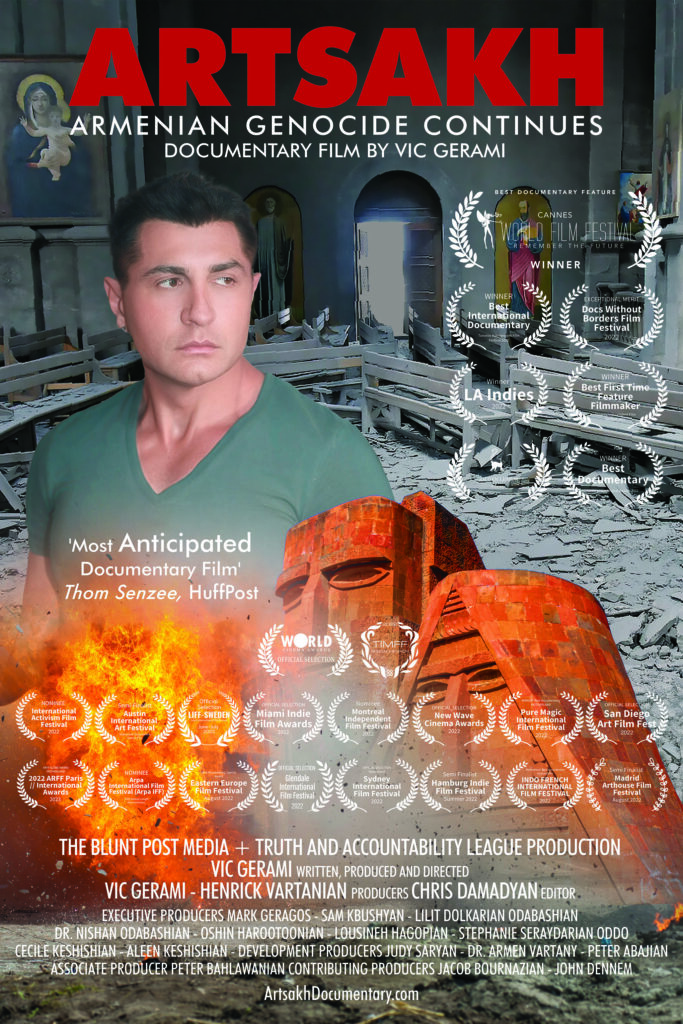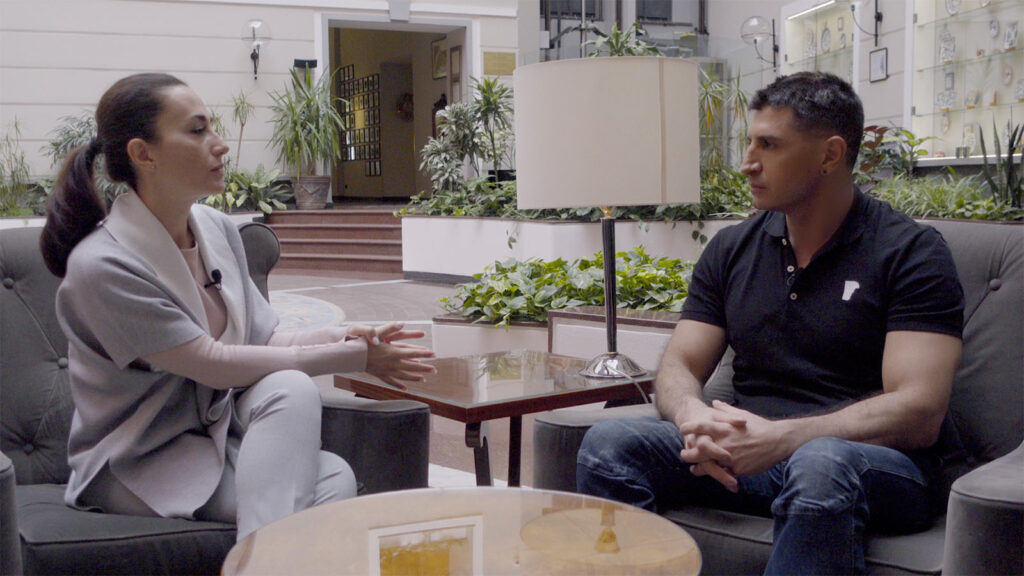A hard-hitting, truth-seeking documentary film has been made and released in true indie spirit, and it is worth your time. The complicated, heartbreaking stories told in it, accompanied by rock-solid journalism and a fact-checking expedition, make for an eye-opening, educational time in front of the screen.
ARTSAKH Armenian Genocide Continues is that film and it gets the Spotlight section on Brave New Hollywood.

This week, we sat down with filmmaker Vic Gerami to dig deeper into his film and the challenges of making it and bringing it to audiences.
Full disclosure: BNH editor-in-chief, Henrick Vartanian served as a camera operator and a producer on this film.
BNH: In a nutshell, if even possible, what is this film about and why now?

VG: ARTSAKH Armenian Genocide Continues is a documentary feature film about the Artsakh Genocide (aka Nagorno-Karabakh) perpetrated by Azerbaijan and Turkiye (Turkey). It tells the story of this ongoing tragic chapter through the lens of an Armenian-American journalist and LGBTQ+ activist, yours truly. Through a journalist’s perspective, ARTSAKH documents Azerbaijan’s and Turkey’s unprovoked genocidal attack and ethnic cleansing against Armenians of Artsakh, also known as Nagorno-Karabakh, starting on September 27, 2020. Azerbaijan, with the declared assistance from Turkey, reawakened the conflict from dormancy by launching a large-scale offensive against Artsakh. In its war effort, Azerbaijan relied on thousands of Turkish-paid jihadist mercenaries airlifted from terrorist camps in Syria, Libya, and Pakistan and brought to fight alongside the Azerbaijani Army. The 2020 invasion opened a new chapter in the history of regional warfare and involved the unmatched suffering of the civilian population. For 44 days, the world watched mainly in deafening silence as over 5,000+ Armenians were massacred.
Genocide ignored is Genocide repeated. What one country does to other people will eventually do to its people. – Vic Gerami
BNH: When did you decide to become a filmmaker and tackle this complicated subject, and did you know what and the amount of work you are going into?
VG: Watching the massacre of Armenians of Artsakh from day one, September 27, 2020, I felt that I had to do something in my capacity. After producing PSAs with celebrities to bring attention to what was happening, I decided that I must document these crimes against humanity. The wounds of the Armenian Genocide of 1915 are still very fresh and unhealed for us Armenians, so being complicit was not an option.
I didn’t know the whole picture, but I knew that it would be a lot of work. But that’s never stopped me before, and this was the most important project I had ever taken on.
BNH: Why is this film important and who should see it?
VG: First, the Artsakh Genocide is the continuation of the Armenian Genocide. This time, another Turkic nation, Azerbaijan, is in the lead, with the original perpetrator of the 1915 Genocide, Turkiye, assisting it.
Secondly, Genocide ignored is Genocide repeated. Look around the world now. Several Genocides are happening now, with millions massacred and victimized, such as Palestine, Sudan, Myanmar (Burma), and the Yazidi Genocide, which was just over ten years ago.
If perpetrators of Genocide are not held accountable and brought to justice, crimes against humanity will continue to plague the world. So, everyone should see it.

BNH: The average American these days, leaving far away from Armenia and Artsakh, with domestic challenges inside the U.S. might ask why they should bother spending time watching this film. What will be your plea, a convincing reason to persuade them?
VG: The average American may not know about Artsakh or may think it doesn’t affect them, but it does. The United States, the UK, and several other nations seemingly unconnected to the Artsakh Genocide had stakes in its outcome and had an indirect hand in it.
What one country does to other people will eventually do to its people.
BNH: Tell us about the pushback or reactions to the film that were either expected, and the use about the ones that surprised you.
VG: I can’t honestly think about any pushback. The reception and feedback have been overwhelmingly positive. There are always people who want you to do it this way or that way, but that’s expected. Even Armenians have told me the film taught them things they didn’t know.
BNH: How did you prepare yourself as the person sitting face-to-face with the actual people who lived these life-altering tragedies? How did you compose yourself or kept your focus?
VG: I was honored and grateful to have so many veterans, refugees, and other eyewitnesses share their personal and painful stories with me. I wanted to tell their experience in the film with respect and delicacy. It was important to me to have the perspective of people from various walks of life, so the film has a comprehensive view and is layered.
BNH: As the filmmaker tackling the subject, you must have had a good amount of knowledge about the history and what you needed to bring back for the film and to tell the story? Did it take a toll on you emotionally and in other ways?
VG: I knew quite a lot about Artsakh, pre-independence, and everything that happened after 1991. I’d also been following developments since Azerbaijan invaded Artsakh on September 27, 2020. The rest was about getting to the truth from people who lived it. Everything in the film, every interview, statement, claim, and declaration is backed by multiple sources and evidence.
No matter how composed you are, the stories you hear affect you. It was difficult hearing what the veterans saw: bodies of their comrades torn apart by drones and missing limbs. One veteran whom I featured in the film witnessed his younger brother get killed right next to him in an attack that left him paralyzed.
Another devastating story was from a woman who had lost everything, her land, home, business, and all belongings and had fled to Armenia. But when I asked her what her most significant loss was, she said that she can’t go back to Artsakh to visit her husband’s gravesite.
BNH: What type of challenges have you faced by pushing this film in front of audiences, and how did they react to it?
VG: Those who see the film are surprised and have nothing but positive feedback. I’ve had non-Armenians watch the film, then arranged for it to be screened in their communities.
But, without a big marketing and PR budget, a lot of it falls on me as a filmmaker. Additionally, mainstream press primarily covers what they know and won’t bother to learn about it. It’s been slow getting coverage, but it’s building.
BNH: What are three important takeaways you hope the audience will take away from watching this new ARTSAKH ARMENIAN GENOCIDE CONTINUES documentary film?
VG: The Armenian Genocide, which began in the late nineteenth century, did not end. The Artsakh Genocide is just another chapter of the same Genocide.
International law only applies when mighty Western powers are affected. Otherwise, they are ignored, especially if the crimes, no matter how egregious, are committed by regimes useful to Western agendas. In this case, crimes against humanity were committed by Azerbaijan and Turkiye.
BNH: Finally, will you do it again? Meaning, will you jump into a project with such complexities and difficulties? Why and why not?
VG: 100% Yes. Despite challenges, making this film was an extraordinary experience and I cherish every minute of it. I look forward to tackling the next chapter, hopefully a happy one.
Where to Watch
You can rent or buy the film on Vimeo.
About the Filmmaker and Subject, Vic Gerami
Vic Gerami is an award-winning journalist, editor of The Blunt Post, and a documentary filmmaker.
Most recently, Gerami wrote, directed, and produced the investigative documentary feature film, ARTSAKH Armenian Genocide Continues, about the Artsakh Genocide (2020-2023).
Gerami is also the founder and Chair of the Truth And Accountability League (TAAL), an organization he created in 2020 in the wake of the Artsakh Genocide and an overwhelming increase in anti-Armenian racism, violence, and Armenophobia.
TAAL is a 501©3 non-profit advocacy organization that monitors and addresses bias, disinformation, propaganda, and slander of the Armenian people and culture at the media level, including social media, academics, intelligentsia, and public policy.
Today, reaching national and international audiences, Gerami first built a foundation of knowledge and skills by learning the media industry during his years at Frontiers Magazine, followed by positions at LA Weekly and Voice Media Group.
As host of his radio program, THE BLUNT POST with VIC, KPFK 90.7 FM (Pacifica Network), Gerami has interviewed 100+ leading members of Congress, plus governors, mayors, celebrities, and other high-profile public figures. A few of his interviewees include Senator Adam Schiff, Senator Bob Menendez, Congresswoman Jackie Speier, Governor Howard Dean, Congresswoman Katie Porter, Congressman Brad Sherman, Congressman Mike Levin, Congresswoman Maxine Waters, Congresswoman Judy Chu, LA District Attorney George Gascon, among many others. You can listen to all the interviews here.
Gerami is also a contributor to some of the nation’s most prominent publications, including the Windy City Times, Bay Area Reporter, Armenian Mirror-Spectator, The Advocate, The Immigrant Magazine, GoWeHo, Destination Luxury, OUT Traveler, and The Fight.
The Wall Street Journal featured Gerami as a ‘leading gay activist’ in its landmark 2008 coverage of opposition to Proposition 8, the ballot measure that for years denied same-sex couples in California the freedom to marry. In addition to his years of volunteer work as a leading advocate for marriage equality, Gerami served as a Planning Committee member for the historic Resist March in 2017.
In 2015, Gerami was referenced in the landmark Supreme Court civil rights case, Obergefell v. Hodges, in which the Court held in a 5–4 decision that the fundamental right to marry is guaranteed to same-sex couples by both the Due Process and the Equal Protection Clauses of the Fourteenth Amendment to the United States Constitution.




